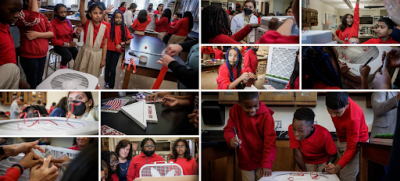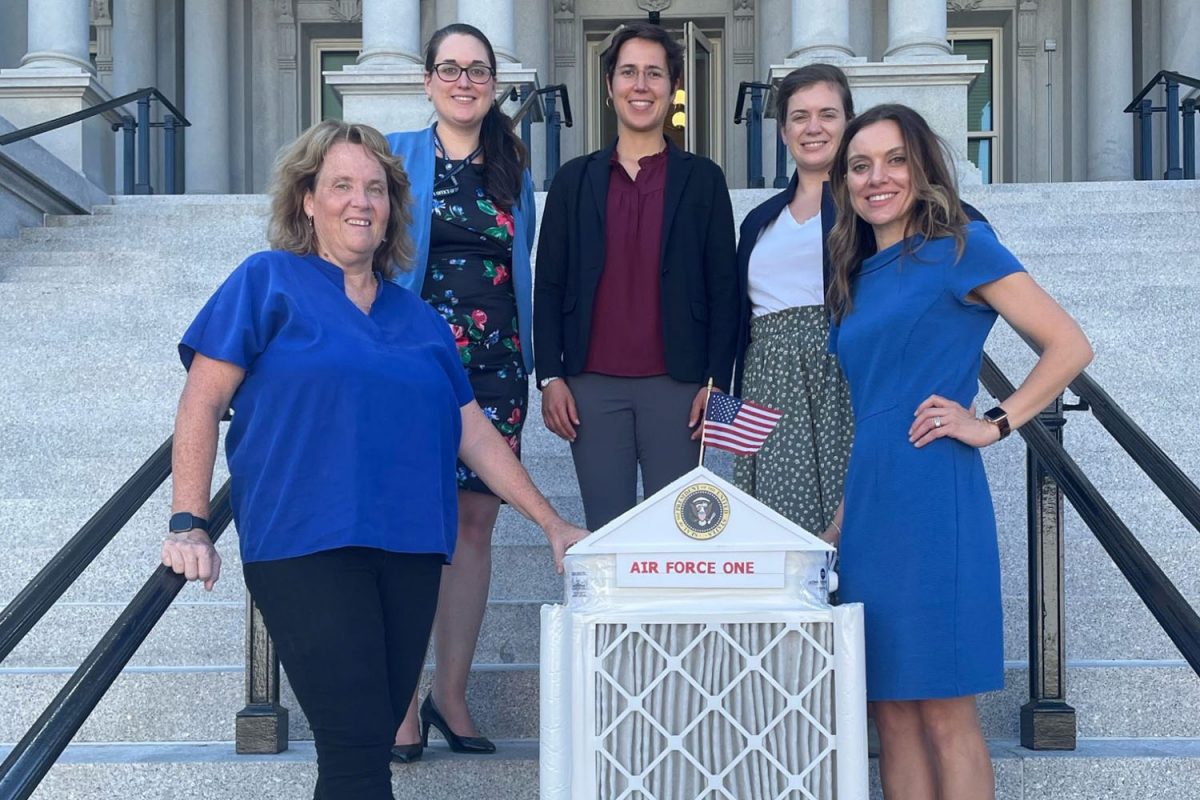 Noah Webster students’ hands-on science lesson is getting the attention of the White House! Recently, Marina Creed, a neuroimmunology nurse practitioner in the UConn Health Multiple Sclerosis Center and Dr. Kristina Wagstrom, associate professor of chemical and biomolecular engineering, taught a class on air pollution to Noah Webster fifth-graders. They helped the class make air filtration boxes, including one decorated to look like the White House itself. The filter was then delivered to President Joe Biden’s Office of Science and Technology Policy.
Noah Webster students’ hands-on science lesson is getting the attention of the White House! Recently, Marina Creed, a neuroimmunology nurse practitioner in the UConn Health Multiple Sclerosis Center and Dr. Kristina Wagstrom, associate professor of chemical and biomolecular engineering, taught a class on air pollution to Noah Webster fifth-graders. They helped the class make air filtration boxes, including one decorated to look like the White House itself. The filter was then delivered to President Joe Biden’s Office of Science and Technology Policy.
office of science
White House’s Office of Science and Technology Policy Recognizes UConn’s Indoor Air Quality Initiative Fighting COVID-19
Story originally published on UConn Today

UConn Health nurse practitioner Marina Creed’s University of Connecticut cross-campus do-it-yourself indoor air purifier project continues to gain momentum — all the way to the White House.
Creed’s patients in UConn Health’s Multiple Sclerosis Center are among the more vulnerable to severe illness from COVID-19. Motivated by her role as both a clinician and a parent, last year she initiated a cross-campus public health initiative to get what are known as “Corsi-Rosenthal Boxes” into public school classrooms.
The boxes are an uncomplicated combination of easily obtained supplies that can be assembled in minutes. The components — a box fan, pleated air filter panels, cardboard and duct tape — add up to less than it costs to travel to Washington, D.C., where Creed presented members of the Biden administration’s Office of Science and Technology Policy (OSTP) a DIY air purifier by the UConn team and Hartford school children.
On September 9 she and UConn School of Engineering’s Associate Professor in Chemical and Biomolecular Engineering Kristina Wagstrom visited a fifth-grade science class at Hartford’s Noah Webster Microsociety Magnet School, where they presented a STEM lesson that included the assembly of two DIY purifiers.
One, decorated in the school’s color, red, stayed in the classroom; the other, decorated as “Air Force One” and signed by the class, would be on its way to the White House the next day.
“It was an incredible opportunity for our team to showcase this important intervention made by Hartford public school students to the Office of Science and Technology Policy and gift ‘Air Force One’ to the team within the executive office of the president,” Creed says. “It was wonderful to see the children’s STEM lesson come to life. The unit is inside the Eisenhower Executive Office Building, and we hope it will make its way into the West Wing for the president and first lady to appreciate.”
The DIY air filtration kits have been shown to be comparable to manufactured portable HEPA filters.
“It was great to see how excited the students were to work on something that would have real impact,” Wagstrom says.
Creed says their UConn team’s research includes using state-of-the-art cloud-based air quality monitoring sensors to capture critical data showing the intervention’s effectiveness in improving indoor air quality in real-world settings. The sensors, called MODULAIR-PM, are provided by Quant-AQ, an air quality startup in Somerville, Massachusetts.
“The evidence is clear – clean indoor air keeps students healthier and happier. We are excited to learn more about how these students put this evidence into action to benefit their community,” said Dr. Erica Kimmerling, Senior Advisor for Public Engagement at the White House Office of Science and Technology Policy. “The ‘Air Force One’ air filter will not only help provide clean air to the staff at the White House Office of Science and Technology Policy but it will be a great conversation starter to help spread the word about the ways people can improve indoor air quality.”
Creed was honored to be gifting the device to the White House OSTP alongside a major advocate of the DIY Corsi-Rosenthal intervention, Kimberly Prather, Distinguished Professor of Atmospheric Chemistry at University of California San Diego (UCSD) and the Scripps Institute of Oceanography. Members of President Biden’s OSTP accepting the gift were Kimmerling, Dr. Georgia Lagoudas, senior advisor for biotechnology and biodefense, and Dr. Stephanie Guerra, assistant director for national security and biodefense.
In the spring, the Office of Science and Technology Policy held a webinar titled “Clear the Air of COVID-19.” Creed emailed the office to explain her indoor air filtration project, and in reply received an invitation to give a 30-minute briefing. As a capstone to the briefing, Creed, whose hometown is Washington, D.C., offered to bring a box made in the community by school children. The response to that was an invitation for a formal delivery to the White House.
“I was humbled that our work is being noticed at the federal level, and I am eager that our project will result in widespread improvements in public health through low-technology, low-cost, energy-efficient STEM projects that fifth grade school children can do,” Creed says. “It was heartwarming to know that a private citizen like myself can take an idea inspired by direct patient care and continue to push for the fruition of the vision that I have had, which is that these should be in every classroom in the state of Connecticut, if not throughout the country. It felt great to know that there’s federal support behind this initiative that we are working on.”
Support isn’t only coming from the federal government. In August the UConn Foundation announced a $300,000 grant funded through cryptocurrency from Balvi, an investment and direct giving fund established by Vitalik Buterin, the co-creator of Ethereum, to back the Indoor Air Quality Initiative. In May, Creed was recognized with one of UConn’s 2022 Provost’s Awards for Excellence in Community Engaged Scholarship.
The filtration systems are named for their creators, Richard Corsi, dean of engineering at the University of California-Davis, and Jim Rosenthal, CEO of Texas-based company Tex-Air Filters. Since last year Creed has been working to get them into Connecticut schools, and to teach students how to make them as part of a science and health lesson.
The students who helped create ‘Air Force One’ at the Webster Magnet School were impressed.
“We made an air filter that can help take away the germs and bacteria, and it’s really useful because a lot of kids got COVID now and earlier in the year,” says Elijah Ruiz, 10, of New Britain.
“It’s really cool that you can just get a few items that only cost a couple of dollars and make something that can make such a difference,” says Mia Lee, 10, of Manchester.
“It’s something that could be life-changing for everybody, and it can cure a lot of diseases, like COVID,” says Nayeli Rockwell, 10, of East Hartford.
What about the idea that something they helped make and put their names on would be going to the White House?
“Out of this world,” Nayeli says.
“That’s crazy,” Elijah says.
“It’s really, really cool, because Joe Biden is our president,” Mia says.
The Indoor Air Quality Initiative’s UConn cross-campus collaborators include: UConn Health and its Comprehensive Multiple Sclerosis Center, UConn School of Medicine and its Department of Public Health Sciences, UConn School of Engineering, UConn School of Nursing, Connecticut Area Health Education Center Network (CT AHEC), and the UConn Neag School of Education.
Twitter Update Courtesy of the Office of Science and Technology Policy
And #teamOSTP was excited to receive a Corsi–Rosenthal box from Noah Webster MicroSociety Magnet School students. These inexpensive, DIY cubes help to clean indoor air, improving cognition and health. “Air Force One,” indeed! Thanks @NWMMSHartford! https://t.co/CBEJTmauwY
— Alondra Nelson (@AlondraNelson46) September 10, 2022